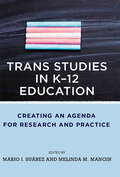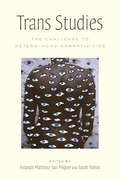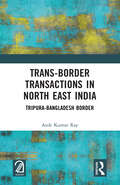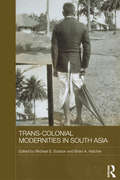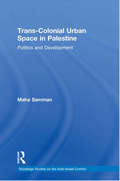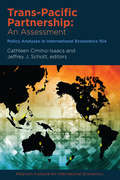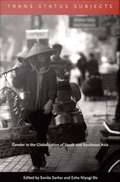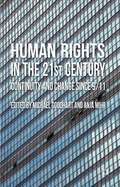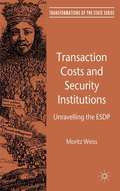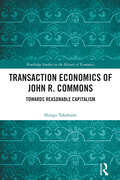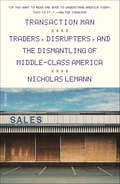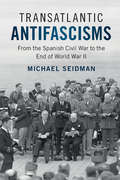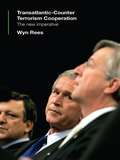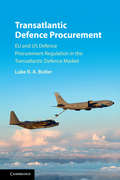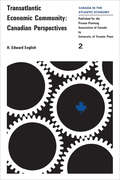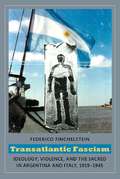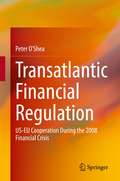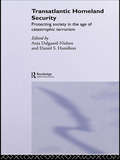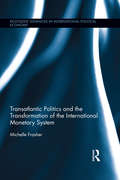- Table View
- List View
Trans Studies in K-12 Education: Creating an Agenda for Research and Practice
by Mario I. Suárez Melinda ManginA vital inquiry into trans issues in education, this compelling work argues for the design of education research, policies, and environments that honor all gender experiences and identities.Edited by two prominent figures in trans studies, Mario I. Suárez and Melinda M. Mangin, Trans Studies in K–12 Education brings together scholars and professionals representing a range of academic traditions, research methodologies, and career backgrounds to explore why and how schools should affirm gender diversity and challenge gender-based inequities.The collection offers a comprehensive examination of how gender is manifested in the educational context. Gathering a wealth of evidence, the book&’s contributors expose the prevailing norm of gendered environments, which are entrenched in the very design and execution of educational research. The collection also lays out a critical overview of US laws and policies related to gender equity, gender identity, and gender expression and how these frameworks impact educational environments. These findings draw attention to deficit-oriented, pathologizing ideologies that surround nonconforming gender identities and the detrimental, often traumatizing effects on transgender students and educators.Throughout, the contributors recommend methods for establishing gender-affirming research, policy, and practice. They outline the sociopolitical and legal pathways that trans and nonbinary students and school employees may use to secure education and workplace rights. They discuss the positive gains made by professional development for teachers, LGBTQ+ advocacy, and community programs that successfully support transgender and gender-nonconforming individuals.Ultimately, the volume highlights the promise of creating K–12 education spaces that are liberating rather than constraining.
Trans Studies: The Challenge to Hetero/Homo Normativities
by Sarah Tobias Genny Beemyn Susan R. Rankin Jian Chen Marcia Ochoa Alexandra Rodriguez de Ruiz Valens Keja Nora Butler Burke Lucas Crawford Yolanda Martinez-San Miguel Aren Z. Aizura Sel J. Hwahng Yolanda Martínez-San Miguel A. Finn Enke Pauline Park Jody L. Herman Toby Beauchamp Mickael Chacha EnriquezFrom Caitlyn Jenner to Laverne Cox, transgender people have rapidly gained public visibility, contesting many basic assumptions about what gender and embodiment mean. The vibrant discipline of Trans Studies explores such challenges in depth, building on the insights of queer and feminist theory to raise provocative questions about the relationships among gender, sexuality, and accepted social norms. Trans Studies is an interdisciplinary essay collection, bringing together leading experts in this burgeoning field and offering insights about how transgender activism and scholarship might transform scholarship and public policy. Taking an intersectional approach, this theoretically sophisticated book deeply grounded in real-world concerns bridges the gaps between activism and academia by offering examples of cutting-edge activism, research, and pedagogy.
Trans and Gender Diverse Ageing in Care Contexts: Research into Practice
by Michael Toze, Paul Willis and Trish Hafford-LetchfieldGender diversity and non-conformity are becoming increasingly visible within society. As more trans and non-binary service users ‘come out’ and trans populations age, practitioners and service providers working in health care, social care, welfare services and housing, will begin to see a growing number of older gender-diverse service users. With contributions from trans and non-binary scholars and practitioners and those with lived experience, this book outlines what good care and support looks like for older trans and non-binary people. This book provides a range of reflective learning activities that can be used by educators, policy makers and practitioners in healthcare, social care, public and community services to develop their knowledge and skills to ensure their practice is affirmative and inclusive.
Trans-Border Transactions in North East India: Tripura-Bangladesh Border
by Asok Kumar RayThis book analyses the cross-border transactions in North-East India, with particular focus on the Tripura-Bangladesh border. It explores the inter-relationship between community, state and market, and also discusses the spatial identity of Tripura in pre and post-partition era and the implications of partition and border-making to the cross-border communities of Tripura and Bangladesh. It reflects on trade transactions between India and Bangladesh and more significantly, on informal cross-border trade, social transactions and people-to-people contact across the border.The subject matter in this book also captures the community anxieties emerging from land boundary institutions and the issues of conflict and development in the cross-border space of Tripura-Bangladesh. It also discusses the dynamics of community inter-dependence and opposition in the post-partition condition in the Tripura and Bangladesh.Print edition not for sale in South Asia (India, Sri Lanka, Nepal, Bangladesh, Pakistan or Bhutan)
Trans-Colonial Modernities in South Asia (Routledge Studies in the Modern History of Asia)
by Brian A. Hatcher Michael S. DodsonPresenting cutting-edge scholarship dedicated to exploring the emergence and articulation of modernity in colonial South Asia, this book builds upon and extends recent insights into the constitutive and multiple projects of colonial modernity. Eschewing the fashionable binaries of resistance and collaboration, the contributors seek to re-conceptualize modernity as a local and transitive practice of cultural conjunction. Whether through a close reading of Anglo-Indian poetry, Urdu rhyming dictionaries, Persian Bible translations, Jain court records, or Bengali polemical literature, the contributors interpret South Asian modernity as emerging from localized, partial and continuously negotiated efforts among a variety of South Asian and European elites. Surveying a range of individuals, regions, and movements, this book supports reflection on the ways traditional scholars and other colonial agents actively appropriated and re-purposed elements of European knowledge, colonial administration, ruling ideology, and material technologies. The book conjures a trans-colonial and trans-national context in which ideas of history, religion, language, science, and nation are defined across disparate religious, ethnic, and linguistic boundaries. Providing new insights into the negotiation and re-interpretation of Western knowledge and modernity, this book is of interest to students and scholars of South Asian Studies, as well as of intellectual and colonial history, comparative literature, and religious studies.
Trans-Colonial Urban Space in Palestine: Politics and Development (Routledge Studies on the Arab-Israeli Conflict)
by Maha SammanTaking a multidisciplinary approach to examine the dynamics of ethno-national contestation and colonialism in Israel/Palestine, this book investigates the approaches for dealing with the colonial and post-colonial urban space, resituating them within the various theoretical frameworks in colonial urban studies. The book uses Henry Lefebvre’s three constituents of space – perceived, conceived and lived – to analyse past and present colonial cases interactively with time. It mixes the non-temporal conceptual framework of analysis of colonialism using literature of previous colonial cases with the inter-temporal abstract Lefebvrian concepts of space to produce an inter-temporal re-reading of them. Israeli colonialism in the occupied areas of 1967, its contractions from Sinai and Gaza, and the implications on the West Bank are analysed in detail. By illustrating the transformations in colonial urban space at different temporal stages, a new phase is proposed - the trans-colonial. This provides a conceptual means to avoid the pitfalls of neo-colonial and post-colonial influences experienced in previous cases, and the book goes on to highlight the implications of such a phase on the Palestinians. It is an important contribution to studies on Middle East Politics and Urban Geography.
Trans-Pacific Partnership: An Assessment
by Cathleen Cimino-Isaacs Jeffrey J. SchottTrans-Pacific Partnership, TPP, Liberalization of Services Trade, Digital Trade, Trade Deals, Trade Facilitation, TPP and Exchange Rates, Economic Effects of the TPP, TPP and the Environment, Income Distribution, Tariff Liberalization, Agriculture, Auto Sector Liberalization, Textiles, Government Procurement, Financial Services, Provisions on Investment, Investor-State Dispute Settlement, Medicines, Dispute Settlement Mechanism, Labor Standards, Customs Administration, Small and Medium-Sized Enterprises, State-Owned Enterprises, Anticorruption, Competition Policy, 978-0-88132-713-7, 978-0-88132-714-4, Peterson Institute for International Economics, PIIE, IIE, Cathleen Cimino-Isaacs, Jeffrey J. Schott
Trans-Pacific Partnership: An Assessment (Policy Analyses in International Economics #104)
by Cathleen Cimino-Isaacs Jeffrey J. SchottThe Trans-Pacific Partnership (TPP) between 12 Pacific Rim countries has generated the most intensive political debate about the role of trade in the United States in a generation. The TPP is one of the broadest and most progressive free trade agreements since the North American Free Trade Agreement (NAFTA). The essays in this Policy Analysis provide estimates of the TPP's benefits and costs and analyze more than 20 issues in the agreement, including environmental and labor standards, tariff schedules, investment and competition policy, intellectual property, ecommerce, services and financial services, government procurement, dispute settlement, and agriculture. Through extensive analysis of the TPP text, PIIE scholars present an indispensable and detailed "reader's guide" that also sheds light on the agreement's merits and shortcomings.
Trans-Status Subjects: Gender in the Globalization of South and Southeast Asia
by Sonita Sarker Esha Niyogi DeA Thai foodseller on the streets of Bangkok, a cyclo driver in a Vietnamese village, a Pahari migrant laborer in the Himalayas, a Parsi-Christian professional social worker shuttling back and forth between London and Calcutta--Trans-Status Subjects examines how these and other South and Southeast Asians affect and are affected by globalization. While much work has focused on the changes wrought by globalization--describing how people maintain foundations or are permanently destabilized--this collection theorizes the complex ways individuals negotiate their identities and create alliances in the midst of both stability and instability, as what the editors call trans-status subjects. Using gender paradigms, historical time, and geographic space as driving analytic concerns, the essays gathered here consider the various ways South and Southeast Asians both perpetuate and resist various hierarchies despite unequal mobilities within economic, social, cultural, and political contexts. The contributors--including literary and film theorists, geographers, historians, sociologists, and anthropologists--show how the dominant colonial powers prefigured the ideologies of gender and sexuality that neocolonial nation-states have later refigured; investigate economic and artistic production; and explore labor, capital, and social change. The essays cover a range of locales--including Sri Lanka, Vietnam, Thailand, Singapore, Borneo, Indonesia, and the United States. In investigating issues of power, mobility, memory, and solidarity in recent eras of globalization, the contributors--scholars and activists from South Asia, Southeast Asia, England, Australia, Canada, and the United States--illuminate various facets of the new concept of trans-status subjects. Trans-Status Subjects carves out a new area of inquiry at the intersection of feminisim and critical geography, as well as globalization, postcolonial, and cultural studies. Contributors. Anannya Bhattacharjee, Esha Niyogi De, Karen Gaul, Ketu Katrak, Karen Leonard, Philippa Levine, Kathryn McMahon, Andrew McRae, Susan Morgan, Nihal Perera, Sonita Sarker, Jael Silliman, Sylvia Tiwon, Gisele Yasmeen
TransFEWmation: Towards Design-led Food-Energy-Water Systems for Future Urbanization (Contemporary Urban Design Thinking)
by Rob RoggemaThis book discusses a spectrum of approaches to designing the food-energy-water nexus at different spatial-urban scales. The book offers a framework for working on the FEW-nexus in a design-led context and integrates the design of urban neighbourhoods and regions with methodologies how to simultaneously engaging residents and stakeholders and evaluating the propositions in a FEW-print, measuring the environmental impact of the different designs. The examples are derived from on the ground practices in Sydney, Tokyo, Detroit, Amsterdam and Belfast.
Transaction Costs and Security Institutions
by Anja Mihr Michael GoodhartThis is the first book to offer a systematic analysis of human rights in the 21st century. The chapters, written from diverse methodological perspectives, provide rich and varied insights on vital questions concerning the resiliency, weaknesses, and prospects of human rights today.
Transaction Costs and Security Institutions
by Moritz WeissExamines international cooperation in European security from a transaction cost economics perspective. This book addresses the puzzle of how to approach differing institutional preferences. It argues that the reduction and limitation of transaction costs was the primary determinant of security preferences.
Transaction Economics of John R. Commons: Towards Reasonable Capitalism (Routledge Studies in the History of Economics)
by Shingo TakahashiTakahashi reconstructs the key blocks of one of the founders of the institutional school, John R. Commons’ theories of the evolution of capitalism and of institutional change by taking the concept of transaction as a central point of departure.Commons’ theories continue to influence modern economics, and in this book, Takahashi scrutinizes his construction of transaction and its features and offers a reinterpretation of Commons’ institutional economics and transaction economics. He then explores how Commons’ analysis of going concerns (e.g., firms) has broader and deeper applications that extend to monetary policy, labor policy, and the business cycle. Takahashi examines how Commons’ and Veblen’s dynamic theories share cumulative causation. He closes by positing that Commons’ transaction economics seeks “reasonable capitalism” through a virtuous cycle of reasonable value and generation of good business ethics.This book will be attractive to researchers of institutional economics, political economy, heterodox economics, as well as the history of economic thought, law, and ethics.
Transaction Man: Traders, Disrupters, and the Dismantling of Middle-Class America
by Nicholas LemannAn Amazon Best History Book of 2019"A splendid and beautifully written illustration of the tremendous importance public policy has for the daily lives of ordinary people." —Ryan Cooper, Washington MonthlyOver the last generation, the United States has undergone seismic changes. Stable institutions have given way to frictionless transactions, which are celebrated no matter what collateral damage they generate. The concentration of great wealth has coincided with the fraying of social ties and the rise of inequality. How did all this come about?In Transaction Man, Nicholas Lemann explains the United States’—and the world’s—great transformation by examining three remarkable individuals who epitomized and helped create their eras. Adolf Berle, Franklin Delano Roosevelt’s chief theorist of the economy, imagined a society dominated by large corporations, which a newly powerful federal government had forced to become benign and stable institutions, contributing to the public good by offering stable employment and generous pensions. By the 1970s, the corporations’ large stockholders grew restive under this regime, and their chief theoretician, Harvard Business School’s Michael Jensen, insisted that firms should maximize shareholder value, whatever the consequences. Today, Silicon Valley titans such as the LinkedIn cofounder and venture capitalist Reid Hoffman hope “networks” can reknit our social fabric.Lemann interweaves these fresh and vivid profiles with a history of the Morgan Stanley investment bank from the 1930s through the financial crisis of 2008, while also tracking the rise and fall of a working-class Chicago neighborhood and the family-run car dealerships at its heart. Incisive and sweeping, Transaction Man is the definitive account of the reengineering of America and the enormous impact it has had on us all.
Transatlantic Antifascisms: From the Spanish Civil War to the End of World War II
by Michael SeidmanAntifascism has received little attention compared to its enemy. No historian or social scientist has previously attempted to define its nature and history - yet antifascism became perhaps the most powerful ideology of the twentieth century. Michael Seidman fills this gap by providing the first comprehensive study of antifascisms in Spain, France, the UK, and USA, with new interpretations of the Spanish Civil War, French Popular Front, and Second World War. He shows how two types of antifascism - revolutionary and counterrevolutionary - developed from 1936 to 1945. Revolutionary antifascism dominated the Spanish Republic during its civil war and re-emerged in Eastern Europe at the end of World War II. By contrast, counterrevolutionary antifascists were hegemonic in France, Britain, and the USA. In Western Europe, they restored conservative republics or constitutional monarchies based on Enlightenment principles. This innovative examination of antifascism will interest a wide range of scholars and students of twentieth-century history.
Transatlantic Counter-Terrorism Cooperation: The New Imperative
by Wyn ReesAn incisive new analysis of transatlantic security cooperation, probing the roots as well as the future directions of this key relationship in world affairs. Since the 1990s, this cooperation has expanded from traditional military security issues into countering terrorism, international organized crime and drug trafficking. This has injected new impetus into transatlantic relations to work together on matters such as intelligence sharing and law enforcement. The events of September 11th 2001 have forced these new patterns of cooperation to the forefront of transatlantic relations.While progress has been made, developing this area of cooperation has been more difficult than expected and this book examines the reasons why. The author argues that many of the difficulties are due to different approaches on either side of the Atlantic and the absence of a dedicated transatlantic security forum in which these issues could be pursued. Furthermore, European nations have been preoccupied with the building of the European Union and have been both reluctant and unable to enter into special patterns of cooperation with the US.
Transatlantic Defence Procurement
by Butler Luke R. A.This volume constitutes the first ever attempt to establish a basis for comparative research on defence procurement regulation. For decades there has been repeated emphasis on the extent to which barriers to trade in Europe and the US prevent a more competitive defence market. Transatlantic Defence Procurement offers a first analysis of the potential impact of defence procurement regulation itself as a barrier to trade between the US and EU. Part I examines the external dimension of a new EU Defence Procurement Directive, focusing on its implications for third countries, in particular the US. Part II examines foreign access and treatment under US law. Part III maps a future research agenda that is essential for a more systematic understanding of legal barriers to transatlantic defence trade. The book provides context for future initiatives, ranging from reformed market access arrangements to a Defence Transatlantic Trade and Investment Partnership and beyond.
Transatlantic Democracy Assistance: Promoting Different Models of Democracy (Democratization Studies)
by Jan HornatThe approaches of EU institutions and the US to democracy assistance often vary quite significantly as both actors choose different means and tactics. The nuances in the understandings of democracy on the part of the EU and the US lead to their promotion of models of democratic governance that are often quite divergent and, in some respects, clashing. This book examines the sources of this divergence and by focusing on the role of the actors’ "democratic identity" it aims to explain the observation that both actors use divergent strategies and instruments to foster democratic governance in third countries. Taking a constructivist view, it demonstrates that the history, expectations and experiences with democracy of each actor significantly inform their respective definition of democracy and thus the model of democracy they promote abroad. This book will be of key interest to scholars, students and practitioners in democracy promotion, democratization, political theory, EU and US foreign policy and assistance, and identity research.
Transatlantic Diplomacy and the Use of Military Force in the Post–Cold War Era
by Mark WintzThis book is an analysis and a set of tools of analysis to explain and understand why, when, where, and how the United States and its major NATO allies will agree or disagree on a collective policy regarding using military force abroad.
Transatlantic Economic Community: Canadian Perspectives
by H. Edward EnglishThe author assesses the place in world affairs of economic co-operation and integration among Atlantic countries, and the prospects for Atlantic relationships in the near future.
Transatlantic Environment and Energy Politics: Comparative and International Perspectives (Global Environmental Governance)
by Henrik SelinEnvironmental and energy policies have become increasingly significant in European and North American politics. This fascinating book uses a wide range of case studies that embrace climate change, product standards, chemical regulations, renewable energy policies, food safety and genetically-modified organisms to examine areas of conflict and cooperation in the transatlantic relationship. While there are many areas where the European Union and the United States are following divergent policy paths, there are also many signs that a more cooperative transatlantic relationship could emerge in the future. Transatlantic Environment and Energy Politics is highly relevant to understanding how the European Union and North America can cooperate more effectively in meeting today's many global environmental and energy policy challenges. It is essential reading for all advanced students and scholars.
Transatlantic Fascism: Ideology, Violence, and the Sacred In Argentina and Italy, 1919-1945
by Federico FinchelsteinIn Transatlantic Fascism, Federico Finchelstein traces the intellectual and cultural connections between Argentine and Italian fascisms, showing how fascism circulates transnationally. From the early 1920s well into the Second World War, Mussolini tried to export Italian fascism to Argentina, the "most Italian" country outside of Italy. (Nearly half the country's population was of Italian descent. ) Drawing on extensive archival research on both sides of the Atlantic, Finchelstein examines Italy's efforts to promote fascism in Argentina by distributing bribes, sending emissaries, and disseminating propaganda through film, radio, and print. He investigates how Argentina's political culture was in turn transformed as Italian fascism was appropriated, reinterpreted, and resisted by the state and the mainstream press, as well as by the Left, the Right, and the radical Right. As Finchelstein explains, nacionalismo, the right-wing ideology that developed in Argentina, was not the wholesale imitation of Italian fascism that Mussolini wished it to be. Argentine nacionalistas conflated Catholicism and fascism, making the bold claim that their movement had a central place in God's designs for their country. Finchelstein explores the fraught efforts of nationalistas to develop a "sacred" ideological doctrine and political program, and he scrutinizes their debates about Nazism, the Spanish Civil War, imperialism, anti-Semitism, and anticommunism. Transatlantic Fascism shows how right-wing groups constructed a distinctive Argentine fascism by appropriating some elements of the Italian model and rejecting others. It reveals the specifically local ways that a global ideology such as fascism crossed national borders.
Transatlantic Financial Regulation: US-EU Cooperation During the 2008 Financial Crisis
by Peter O'SheaThis book examines cooperation between the US and the EU on financial regulatory reform, notably at the outset and the first three years of the global financial crisis. It discusses the development of US-EU cooperation on financial regulation over the last few decades at several levels, including at heads of state level, markets regulator level and at international level, and progresses with a detailed examination of cooperation at the outset of the financial crisis. It looks at the nature of and motivation for intense US-EU cooperation on coordinating a response to the crisis and presents a compelling argument that a defacto alliance was formed, which served to benefit respective US and EU interests domestically and in the international financial system. Providing a new perspective on financial regulatory reform after the last financial crisis and the relationship of regulatory outcomes to international financial governance, this volume will be of use to researchers interested in transatlantic relations, financial regulation, international relations, global governance, and the European Union, as well as professionals and policymakers working in foreign relations, financial markets, or banking policy.
Transatlantic Homeland Security: Protecting Society in the Age of Catastrophic Terrorism
by Anja Dalgaard-Nielsen Daniel HamiltonThis major new study presents both conceptual and practical guidance at a crucial time when intellectual and practical efforts to protect against the new terrorism should move beyond a purely domestic focus. Creating an effective and integrated national homeland security effort is a significant challenge. Europe and the United States have reacted differently to the emergence of mass casualty terrorism, but must work together to cope with the diverse issue areas, sectors, professions, and relevant actors involved in such a broad-based concept. The authors suggest that Europe and the US have a lot to gain by coordinating more closely, and that the exchange of experience is crucial as we attempt to stay ahead of a learning enemy.
Transatlantic Politics and the Transformation of the International Monetary System (Routledge Advances in International Political Economy)
by Michelle FrasherWith original archival documents and interviews from the US and Europe, Michelle Frasher brings the reader into the negotiating room with American, German, and French officials as they confronted the collapse of the Bretton Woods monetary system and made decisions that affected the course of European integration and the contemporary neoliberal order. She identifies crisis as the catalyst for change in international monetary policies, but argues that the causes of crisis originated from a multitude of factors such as market speculation, American hegemony, institutional flaws, and ideational conflicts among the leaders themselves. Far from a planned and consensual process, this book shows that the transformation to neoliberalism was riddled with discord and fret with trial and error. She argues that the resulting currency regime allowed governments to entrench themselves in national interests and facilitated the "marketization" of the state, where states have became both clients and participants in the financialized global economy—to the detriment of international stability. Frasher’s is the first work to connect the 1960s and 1970s to the difficulties of inter-state and inter-market cooperation that have plagued the system in the last decades, and it puts the 2008 debacle into historical perspective.
